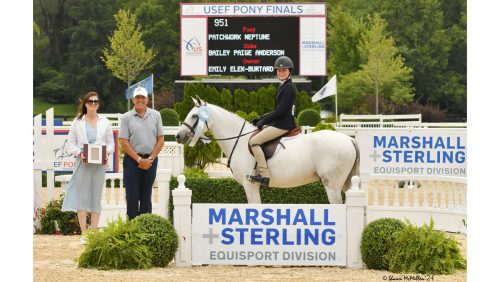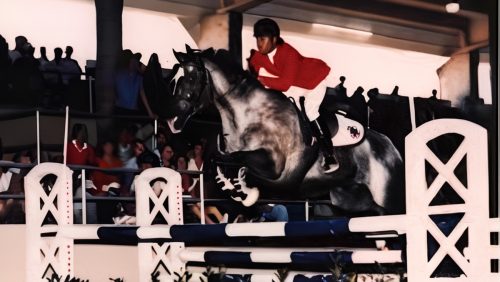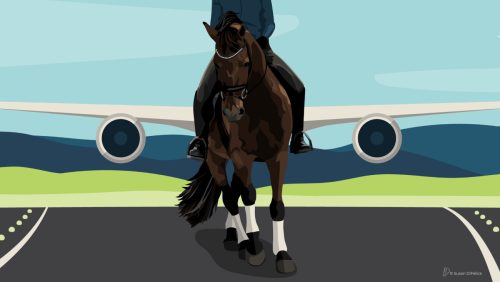Introducing our new advice column, Ask Stable Sage, where we answer queries from readers about horse- and life-related issues, especially where the two intersect. Take our suggestions with a grain of salt, or at least one sugar cube. This column is intended for entertainment purposes only and should not be considered legal advice.
Have a question for Stable Sage? Email it to coth.advice@gmail.com. We reserve the right to edit your submission for clarity and length, and we promise to keep it anonymous. Please don’t send us questions better intended for your veterinarian or your trainer: We can’t improve your flying changes or half-pass in this format.
Dear Stable Sage,
Sometimes it feels like my horse life and my real life are playing tug-of-war, and my bank account is the rope. I’m 27 and have been competitive on the A circuit since the ponies. My parents supported my passion through college (and I am so grateful!), but now I’m fully responsible for funding it while working an office 9-to-5 job. The pay is decent—it’s not like I’m surviving on ramen—but as soon as my paycheck drops, it vanishes into the abyss of board, farrier, vet bills and more.
It’s not just the basics. There are the twice-weekly lessons, clinics every time Big Name Rider comes through town, acupuncture, chiro, supplements, etc. And don’t even get me started on horse shows; I can spend more on a single class entry—so, like, two whole minutes in the ring—than I spend on a car payment.
Relying on my credit card feels like playing with Monopoly money, and that can’t be good. But saying “no” feels like giving up on something that’s part of my identity. I watch my barn friends making it work, and I can’t help but wonder why I can’t seem to, and then I get resentful. I’m fully committed, but my finances aren’t keeping up. Help?
Passionate Rider, Penniless Wallet
______________________________________________________________
Dear Passionate/Penniless,
Ah, the sad truth that launched a thousand memes:
- Where did all my money go? Oh yeah, I’m riding it.
- As addictive as cocaine, and twice as expensive!
- The cheapest part of owning a horse? The price of the horse.
- Bankruptcy starter kit!
Soooo hilarious. “Horse poor” is an inside joke that bonds us together as we pass it around. Being broke is just part of the deal, right?
ADVERTISEMENT
But behind the laughs, there’s a real issue that needs addressing. An anecdote: In my mid-20s, I hauled to a competition about five hours away. I don’t remember what color ribbon we won, but I do recall realizing on Sunday morning that my bank account was overdrawn, and I didn’t have fuel money to get home. A horse show mom lent me some cash, which I accepted with a knot in my stomach.
It should have been a wake up call to rethink living beyond my means. Instead? I doubled-down. All in! No risk, no reward! Olympics or bust, baby! I got my first credit card, then three more, and later a personal loan. Interest is a b***h, and well over a decade later, I’m still paying it all down. Oh, and for the record: still no Olympics.
Sports culture has historically glorified a whatever-it-takes mentality. We value “Athlete Achieves Glory Through Risk-Taking and Sacrifice,” not “Athlete Balances Passion with Fiscal Responsibility.”
It’s easy to internalize that narrative. I hear it in your letter, Passionate/Penniless: “I’m fully committed, but …” as if financial limitations diminish your dedication. Let’s challenge that belief.
So, you’ve always ridden on the AA circuit. What are you getting from that experience that you wouldn’t at a more affordable, unrecognized competition? At both, you test yourself and your horse against a course of seven to 10 jumps in front of a judge. Is it about points, qualifying for finals, or proving something to yourself or someone else? Is it because AA is what you’ve always done? Do you think less of riders who compete at unrated shows? Why?
Get even more granular. Why do you ride? Is your passion fueled by seeing your name in a magazine for finishing third in a prestigious class, or can you feel fulfilled by working every day to become a better rider and improving your horse’s fitness and ability and your relationship with your horse? You have to be able to unhook passion from ambition, or you’re just going to end up in debt and unhappy.
Having these hard conversations with yourself or a good sports psychologist can reveal blind spots that could be influencing your decisions and mindset around your commitment. Once you start examining these beliefs, you may realize there are alternative paths for maintaining your passion that don’t involve launching “RidingCropGirl” on OnlyFans or living out of your car.
Listen, I wish there was a magic bullet but (womp-womp) there is not. The fact is, participating in this sport at the level you’re used to requires resources that you don’t have at this moment in your life. If you’ve done your emotional homework and determined that high-level competition is truly the path you want, you’ve got to play the long-game. Channel that drive and determination of yours toward building a career that will financially support it.
In the meantime, here are a few strategies to help bridge the gap between passion and practicality:
1. Budgeting Beyond The Basics
We’re talking actual spreadsheets. (I promise, it’s not as bad as it sounds.) Create a horse-centric budget that includes not just board, farrier and vet but all the sneaky extras. Association dues? Include ‘em. Joint supplement? On the list. And don’t forget a cushion for the inevitable surprise expense, because it’s horses we’re talking about. Seeing it all on paper makes it easier to prioritize and plan.
2. The “Why” Test
ADVERTISEMENT
Before RSVPing to that clinic or splurging on the ionic stable sheet, ask: Will this improve my horse’s health or my riding in a measurable way? If the answer leans more towards “It’d be nice” or “Everyone’s doing it,” consider cheaper alternatives or waiting. For instance, audit a clinic instead of riding in it.
3. Dialing Down, Not Back
Swap twice-weekly lessons for bi-weekly and use off weeks for focused solo rides. Get a buddy and take turns videoing one another. Not only will you save money, you’ll improve your independence and problem-solving in the saddle. Another example: Before giving the vet clearance to do alllll the diagnostics on a “barely there” unsoundness, maybe give that horse a couple weeks of rest first to see if it resolves. (But if your horse has a veterinary emergency, that’s obviously not a place to cut any financial corners.)
4. The Power Of Horse-Pooling
Sharing expenses isn’t just for carpooling soccer parents. Got a barn buddy who needs to trailer to shows or would go in on that massage mitt you know your horse would love? Pooling resources cuts costs without cutting corners. You might even consider a half- or quarter-lease of your horse, if there’s a good fit.
5. Side Hustle, Horse Hustle
Can your passion pay back, even a little? Braiding manes, cleaning tack, or weekend barn-sitting can add up. Consider what transferable skills you might possess—for instance, offering to run the barn’s social media in exchange for board. A few hundred dollars here and there can go a long way.
6. The Credit Card Conundrum
Tough love: Credit cards can be tools or traps. If you’re leaning on them to close budget gaps, reassess and aim to pay down balances before charging more. Use your tax return to clear debt instead of hitting up one more horse show. Not as much fun, I know, but a sustainable plan means your horse life stays a joy, not a stressor.
Finances won’t be the only limitation life places on your riding. Your horse might get injured, or you might get sick. Work could get hectic, maybe you get swept off your feet by a relationship, or you start a family or become a caretaker for aging parents. Horse life isn’t an all-out sprint but a marathon of seasons, some slower than others. The sooner you learn to navigate them with patience, the better off you’ll be.
One last thing: I’m glad you acknowledge your privilege. So many people blow past that without a second thought. The fact that you recognize the support your parents gave you and hold onto that gratitude says a lot about who you are.
Gratitude isn’t just a nice feeling—it’s a tool. It grounds you and helps you be present in the moment, even when you aren’t able to do the sport in exactly the way you want. Don’t lose sight of that. It’s what makes the ride worth it.
Happy riding (and budgeting).














